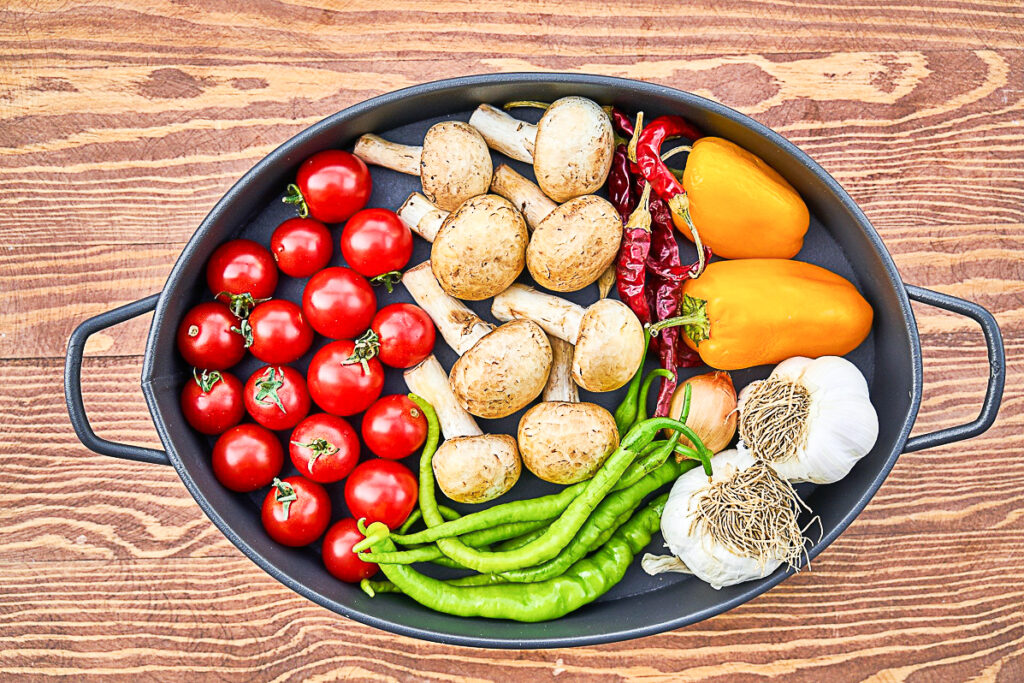Humans have enjoyed different varieties of mushrooms for many years. You can buy mushrooms from a supermarket or a grocery store. You can even grow mushrooms at home. Stores tend to sell mushrooms alongside vegetables and fruits, but are mushrooms a vegetable?
*This post contains compensated links. Find more info in my DISCLAIMER. As an Amazon Associate, I earn from qualifying purchases.
Learn how to grow mushrooms at home with our recommended Best Mushroom Starter Kits.
Are Mushrooms A Vegetable?
Scientists classify mushrooms as fungi. Mushrooms do not have seeds, roots, or leaves. They also do not need light to grow and hence are not an actual vegetable. But, that’s not all that home gardeners need to know.
All plants contain chlorophyll. Chlorophyll converts energy from sunlight into carbohydrates. It’s also what gives plants their green color. However, mushrooms do not have chlorophyll. Mushrooms get the carbohydrates that they need from plants.
We can answer the question, are mushrooms a vegetable, based on two aspects. The scientific characteristics and the nutrition value of mushrooms.

Here Are Some Mushroom Facts
Mushrooms are a reproductive structure produced by fungi. They are like fruits of a plant. However, they are not grown from seeds but spores.
Spores are microscopic and form underneath mushroom caps or in their gills. Wind and animals spread the spores.
When the spores land on a substrate, they sprout to form microscopic rooting threads. A substrate is a suitable medium where mushrooms find their nutrients, such as wood or soil.
Mycelium is the network of microscopic rooting threads of mushrooms. Mycelium penetrates its way into the new source of food.
Mycelium is persistent, unlike a mushroom, which will pop up and die away quickly. Mycelium will live for many years extracting nutrients and sending up crops of mushrooms.
Learn some tips on how to grow mushrooms at home:
Learn How To Grow Mushrooms At Home
Tips For Growing Mushrooms Indoors
5 Steps For Growing Mushrooms In Coffee Grounds
Mushroom Health Benefits
Mushrooms have a meaty texture and delicate flavor. They are widely liked for their fantastic health benefits and great taste.
Mushrooms make an excellent addition to your diet because they have essential minerals and vitamins. The Minerals and vitamins available in mushrooms bring about the question, are mushrooms a vegetable?
Mushrooms are low in calories and have nutritional values. They are an essential part of a diet because they have minerals, antioxidants, and health-boosting minerals.
Mushrooms exposed to ultraviolet light are rich in vitamin D, an essential component of bone structure and immune health. Crimini mushrooms are particularly rich in zinc. Zinc is vital for the system and for ensuring the optimal growth of children and infants.
Some essential mushroom health benefits include:
- Lowering blood pressure: Mushrooms are rich in potassium, which reduces the adverse effects of sodium in our body. Potassium lowers the tension in the blood vessels hence helping in lowering blood pressure.
- Boosting the immune system: Mushrooms have an anti-inflammatory effect that significantly improves the immune system. Research shows that mushrooms stimulate macrophages in the immune system. Mushrooms make you less susceptible to illnesses by enhancing the ability to defeat foreign bodies.
- Weight loss: Studies show that a combination of mushrooms, exercises, and other lifestyle changes helps in reducing weight. Substituting beef with mushrooms improves body mass index and belly circumference. Mushrooms have antioxidants that reduce the risk of metabolic disorders and hypertension.
- Nutrition: Mushrooms have low calories and are rich in fiber, antioxidants, and protein. They also help prevent serious health diseases such as cancer, diabetes, and Alzheimer’s heart disease.
What Is A Fungus?

Fungus is a known species of organisms that include mushrooms, mildews, yeasts, smuts, rusts, and molds. Fungi are widely distributed on earth and are of great medical and environmental importance.
Fungi are free-living in water or soil. Other fungi form parasitic relationships with animals or plants.
Fungi are different from other living organisms because of their mode of nutrient intake and vegetative growth. Fungi grow from the bodies of organisms and digest their matter externally before they absorb it.
Mushrooms are recognized as fungi. Fungi and bacteria are responsible for releasing oxygen, phosphorus, carbon, and nitrogen into the atmosphere by breaking down organic matter.
Fungi are essential in many industrial and household processes, particularly in making wine, beer, and bread. Some fungi, such as mushrooms, truffles, and morels, are also food.
What Is Considered A Vegetable?
A vegetable is the edible part of a plant. We classify vegetables according to the part of the plant that we eat. This could be the stem, tubers, roots, leaves, flowers, or bulbs.
However, some fruits and seeds are also vegetables. Fruits are mature ovaries of plants. Fruits such as tomatoes, pepper, squash, and eggplants are considered vegetables. Some seeds, such as peas, are also classified as vegetables.
Want to start a hydroponic garden at home easily? Check out our recommendations for Best Hydroponics Starter Kits for Beginners.
Is A Mushroom A Vegetable?
Botany classifies mushrooms as fungi. However, in terms of nutrition, we consider mushrooms as a vegetable. Mushrooms provide the same nutrients as vegetables. We also prepare mushrooms the same way we do our vegetables.
Is this confusing? Does this mean we can’t truly answer the question of whether a mushroom is a vegetable? Yes and no.
How To Grow Mushrooms At Home
Just like any other vegetable, humans have been growing mushrooms at home for many years. You can grow mushrooms indoors or alongside other vegetables outdoors.
Growing mushrooms at home is pretty straightforward. They also need very little space to grow. You can grow your mushrooms in an unused basement, closet, or even in small areas like under the sink.
Mushrooms need a conducive environment to grow. They thrive well in humid, dark, and cold temperatures. They also need a medium to grow on. The medium will provide the nutrients that the mushroom will require.
Mediums such as coffee beans and sawdust are the best. However, you can use regular potting soil to grow mushrooms, provided you mix it with a medium to provide nutrients.
Mushroom growing kits are perfect for growing mushrooms at home. They come with everything prepared, and all you have to do is spray water onto the medium.
Mushrooms And Vegetables FAQs
Scientists classify mushrooms as fungi. Mushrooms have no seeds, leaves, or roots, and they don’t need sunlight to grow. However, the U.S. Department of Agriculture classifies mushrooms as vegetables because they provide the same nutrition values.
Mushrooms have a lot of health benefits. They have essential minerals, vitamins, and antioxidants that are helpful to the body.
Mushrooms have a meaty texture and flavor. They are also rich in protein and low in calories, making them great for vegetarians.
In addition to being delicious, mushrooms have a number of health benefits. Most mushrooms are packed with fiber and protein. They are a super antioxidant providing benefits to fight heart disease and some cancer. Medical advice should always be sought with regards to the benefits of eating mushrooms.
